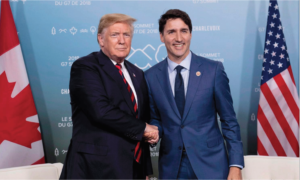
The United States-Mexico-Canada Agreement was signed on September 30 by the leaders of all three nations. Photo courtesy of The Washington Post
On September 30, the leaders of the United States, Mexico, and Canada signed the United States-Mexico-Canada Agreement (USMCA), a revamping of the nearly 25-year-old North American Free Trade Agreement (NAFTA). The deal came as a victory for President Trump, who frequently calls NAFTA a “disaster” and aimed to renegotiate it throughout his campaign. The USMCA is poised to come into effect by 2020 and stands to make changes in industries such as automobile manufacturing and dairy. However, the USMCA also makes significant changes that threaten each nation’s trade with China – this is a fatal flaw.
The USMCA severely restricts trade with China, although rather indirectly. Article 32.10 of the agreement states that any country in the USMCA shall notify the other two if it means to engage in trade negotiations with a “non-market” country and must allow them to review the full text of any agreements signed. The clause states that if the other countries review the agreement and decide that it will affect trade between them, they can end the USMCA with a six-month notice and replace it with a bilateral agreement. Technically, this clause could apply to any “non-market” country, but government officials in Beijing have openly criticized the clause as being unfairly directed at China. This criticism is not unfounded. The Trump administration has recently been engaging in a trade war with China, passing high tariffs on Chinese imports. Therefore, the U.S. government certainly has reason to try to limit Chinese economic influences with its North American trading partners. In Trump’s mind, if he wants to win the ongoing trade war with China, he must block his own allies from trading with China too.
The clause, reportedly submitted by the United States towards the end of the negotiating process, is also a clear indicator of the false equality between the United States and its neighbors. Mexican President Enrique Peña Nieto and Canadian Prime Minister Justin Trudeau both have previously sought increased commerce with China, which is Canada’s second-largest and Mexico’s fourth-largest trading partner, yet the renegotiation of NAFTA forced each country to significantly slow down any efforts to create stronger trading ties with China. The United States is both nations’ top trading partner, and the U.S. essentially forced both countries to choose between trade with the United States and with China. Such diplomatic strong-arming emphasizes the fact that while the USMCA is technically an agreement between three nations, the United States exerts a clear position of power over the other two.
The USMCA’s “China clause” is flawed in both its intention and execution. Firstly, the reality of the Trump Administration’s trade war with China is manifested in Article 32.10 of the USCMA, as it robs all three North American nations of valuable trade opportunities. From a purely economic standpoint, trade with China offers cheap goods for a much lower price than goods produced by any of the three member nations of the USMCA. The primary goal of the Trump Administration in enacting so many rules and regulations regarding Chinese imports is to protect manufacturing jobs in the United States. However, considering that most jobs lost in manufacturing are lost as a result of automation and that Chinese imports provide goods for ordinary citizens at much lower costs than American goods, such economic protectionism is clearly not a viable solution to unemployment in the manufacturing sector and only serves to hurt ordinary Americans rather than help them. The United States’ abuse of its role as a major trading partner of Mexico and Canada is extremely unfair to both countries. Free-trade agreements are meant to increase trade between its members, not to limit trade between its members and outside countries.
The stipulations within Article 32.10 are also much more beneficial to the U.S. than to Canada and Mexico. Our North American neighbors rely heavily on the U.S. for much of their trade, but this reliance is not completely mutual. If the United States signed an agreement with one of the “non-market” countries described by the clause, neither Mexico or Canada would be likely to do anything because neither country can afford to lose the U.S. as a trading partner. Conversely, the U.S. is perfectly capable of enforcing this clause.
In truth, the USMCA does not make much of a difference when it comes to actual trade in North America. Other than the clauses targeting China, only small parts of NAFTA have been adjusted, and the agreement generally will have a similar impact. While the fate of the U.S.-China trade war is uncertain, what is evident is that the United States has tightened its leash on Canada and Mexico in attempt to pull them away from China.




